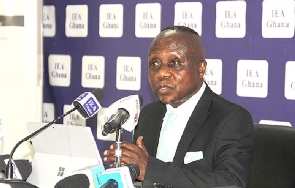The Institute of Economic Affairs (IEA) is advocating for the establishment of a Currency Board as part of efforts to limit Central Bank [Bank of Ghana] lending to government.
According to the Institute, a Currency Board, when established will support the stabilisation of the local currency against major trading currencies and help prevent shocks in the local economy.
The IEA in a statement issued believes the Currency Board comes with a limited inflation system which can prevent depreciation while balance of payment issues which could become rare.
“You see, a Currency Board (CB) is a rigid monetary management system that is hedged in strict rules, with little room for discretion. The CB does not lend to government and it covers its currency fully by foreign exchange”.
“The CB system has limited inflation, the currency does not depreciate and balance of payments crises are rare. This is close to the system in our Francophone neighbours, who restrict their Central Bank lending to governments and provide adequate cover for their currency, the CFA," the IEA emphasised.
The IEA further pointed out that Francophone nations, for example, have systems that guarantee them low inflation and a stable currency whereas “in Ghana, we have chosen an independent Central Bank to conduct discretionary monetary policy".
The Institute in its statement, however, apportioned blame to the Bank of Ghana for the current economic crisis which is now seeking an IMF bailout to support balance of payments and restore macroeconomic stability.
“The Central Bank provides significant lending to government and covers the cedi with limited foreign exchange (40% in the Act). No doubt we face perennial price and currency instability!”
“It is for this reason that some of us have argued that if we continue to abuse policy discretion and pay a high price for it in terms of macroeconomic instability, then we better hedge our policies by rules; tie our economic managers hands, so that we can enjoy rules-driven macroeconomic stability!” it added.
In conclusion, the IEA said that politicization has significantly impacted the implementation of the Public Financial Management Act, the Bank of Ghana Act and the Fiscal Responsibility Act which are meant to help check the use of public finances and manage the economy.
“Let me say that it is not that we have had no rules at all in fiscal and monetary management. In fact, I can mention a couple of them, such as the Public Financial Management Act, the Bank of Ghana Act, the Fiscal Responsibility Act and the relevant provisions in the 1992 Constitution, which represent attempts to introduce rules in our fiscal and monetary management system”.
“However, there are serious questions regarding not only their enforcement but their effectiveness as well. And that is the reason we feel strongly about the need to give constitutional backing to some of these rules”, the IEA concluded.
Watch the latest edition of BizTech and Biz Headlines below:
Share your news stories and ideas with GhanaWeb

Or
Contact GhanaWeb to advertise your product or services

MA/FNOQ
Business News of Thursday, 20 April 2023
Source: www.ghanaweb.com

















